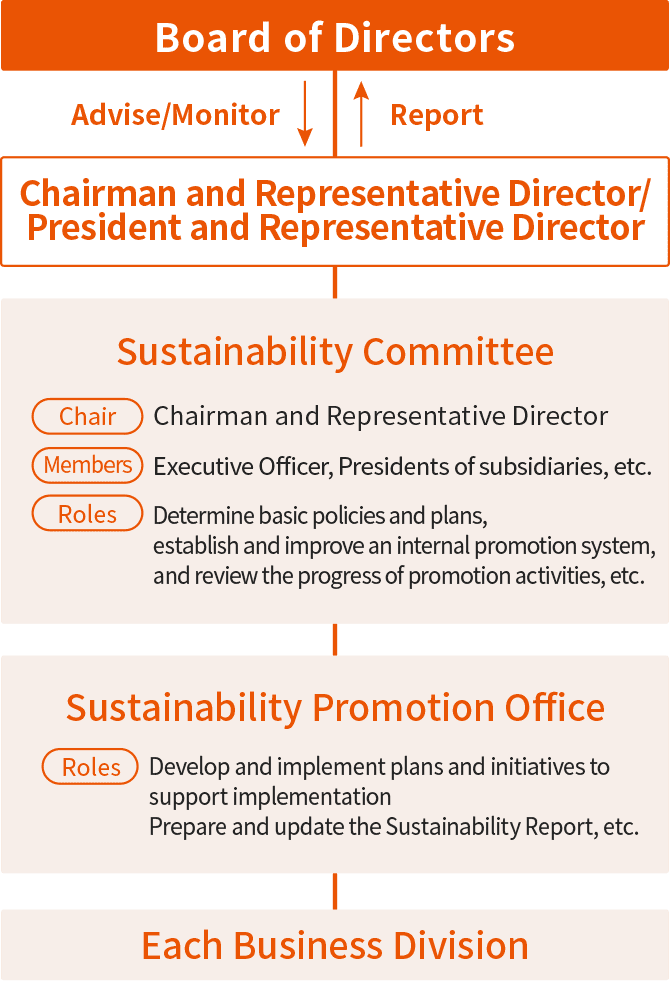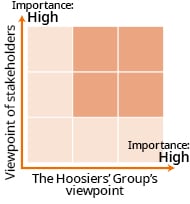ESG STRATEGY
- ESG basic policy
- Structure to promote ESG
- ESG themes and Group targets/policies
- Decision-making process for ESG themes
ESG basic policy
The Hoosiers Group will contribute to solving social issues and realizing sustainable society through ESG-conscious business activities and social/community service activities. We also aim to increase enduring corporate value by continuing to be a company preferred by customers and society.
As a system to promote ESG activities toward new value creation and social contribution, we set three key themes (“Affluent lifestyle,” “Collaborative regional development,” and “Environment”) and two basic themes (“Wellness” and “Governance”), aiming to promote both the business strategy and ESG strategy simultaneously.
ESG promotion system
A Social Impact Developer
New value creation and social contribution through business activities
-
Key themes
The Group recognizes building houses that support various lifestyles, social issues faced by regional cities, and environmental issues such as climate change as its key management issues. So, we defined initiatives to brighten people’s lives as “Affluent lifestyle,” those to vitalize regions as “Collaborative regional development,” and measures against environmental issues as “Environment.” We will aim to become “A Social Impact Developer®,” which the Group set as "Purpose," by creating new value and contributing to society through our business activities.
Basic themes
The Group considers that securing health and safety of our employees and establishing a highly transparent and efficient management system are important management issues in continuing fair and sound business activities as a company. Accordingly, we have defined the initiatives to enhance human capital such as maintenance of our employees’ health and improvement of working environment as “Wellness” and those to enhance compliance and risk management as “Governance” to promote the establishment of a company base. We believe these initiatives will lead to new value creation and support sustainable corporate activities toward social contribution.
During the course of its business activities in a wide range of domains from development to operations management of real estate, the Group is connected with various regional communities. Therefore, we believe that it is our duty as a good corporate citizen to proactively fulfill a role to support and work with society while seeking harmonious balance between interests of our own and society.
As part of such efforts, the Group is engaged in social/community service activities mainly in its mainstay real estate field such as recovery support for disaster-stricken areas and conservation and management of traditional Kyomachiya (townhouse in Kyoto). We believe these activities will lead to pursuit of the “dream life” and realization of sustainable society.
Structure to promote ESG

To promote ESG management within the entire Group toward the realization of a sustainable society, the Company established the Sustainability Promotion Office in April 2021, and established the Sustainability Committee in December 2021 chaired by President and Representative Director, Executive Officer and comprised of Executive Officers, Audit & Supervisory Committee Member, subsidiaries' presidents, etc.
The roles of the Sustainability Committee include determining the basic policies and plans related to the Group’s sustainability strategy, including response to climate changes, establishing and improving an internal promotion system, reviewing the progress of the sustainability promotion activities, and managing risk factors. We also have a system whereby the Board of Directors checks the status of the sustainability initiatives and monitors the risk factors based on the regular reports from the Sustainability Committee on its activities and provides advice to management, as necessary.
ESG themes and Group targets/policies
⇔scroll
| ESG themes | Material issues | Related SDGs | Group targets/policies*1 | |
|---|---|---|---|---|
| Key themes | Affluent lifestyle |
|
|
|
| Collaborative regional development |
|
|
|
|
| Environment |
|
|
|
|
| Basic themes | Wellness |
|
|
|
| Governance |
|
|
|
|
| Social/community service activities |
|
|
|
*1) “Environment” sets more specific targets than other ESG themes in the Group targets/policies.
Group targets/policies [Environment]
-
Response to climate changes
- Development of eco-friendly property
- New condominium apartments:
Make all properties to be supplied meet the requirements of ZEH-M Oriented*2 or higher by FY2030 - New rental property (Acquired “DBJ Green Building Certification”*3):
Start construction of one every year
- New condominium apartments:
- Reduce greenhouse gas emissions
- Reduce energy consumption
- Use renewable energy
- Development of eco-friendly property
-
Appropriately use resources and procure goods
- Reduce water consumption
- Promote sustainable procurement
Prevent pollution and reduce wastes
- Thoroughly implement pollution prevention measures
- Appropriately manage and reduce wastes
*2) ZEH stands for “Net Zero Energy House” and refers to “a house designed to achieve net zero annual primary energy consumption by saving as much energy as possible while maintaining comfortable indoor environment through significant improvement of heat insulation efficiencies of building outer skins and introduction of high-efficiency equipment and systems and renewable energy, etc. The ZEH-M ranks for a complex housing are “ZEH-M” (energy saving effect: 100% or more), “Nearly ZEH-M” (energy saving effect: 75% - 100%), “ZEH-M Ready” (energy saving effect: 50% - 75%), and “ZEH-M Oriented” (energy saving effect: 20% or more).
*3) DBJ Green Building Certification is a certification system established by Development Bank of Japan Inc. in April 2011 to support environmentally and socially conscious real estates (“Green Building”). The system evaluates the real estates needed by the society and economy on a five-point scale and grant certification based on a comprehensive evaluation of factors including the properties’ environmental performance and responses to various stakeholders including disaster prevention and consideration for community.
Decision-making process for ESG themes
The Group has selected 14 items as material issues to realize continued development of the Company and sustainable society and determined five ESG themes to solve these issues. In selecting material issues, we considered a wide variety of social issues in Japan and overseas from the viewpoints of the Group and its stakeholders.
-
STEP1
Considered and identified social issues
To understand social issues in our business environment, we first arranged global issues (e.g. climate change, environmental pollution, human rights issues) and Japan-specific issues (e.g. aging population, declination of regional cities) and then identified a diverse range of social issues that the Group can work on based on whether they are related to the real estate industry.
-
STEP2
Assessed identified issues
We assessed the importance of the identified issues from the viewpoints of (1) stakeholders (whether stakeholders should work on the domain) and (2) the Hoosiers Group (whether the Group should be committed to the domain)


-
STEP3
Identified material issues
14 highly important items were identified as material issues (materiality) that the Group should work on based on two perspectives of “Stakeholders’ viewpoint” and the “Hoosiers’ Group’s viewpoint.”
-
STEP4
Developed ESG themes
Based on the above, we developed ESG themes as well as three key themes (“Affluent lifestyle,” “Collaborative regional development,” and “Environment”) and two basic themes (“Wellness” and “Governance”).
